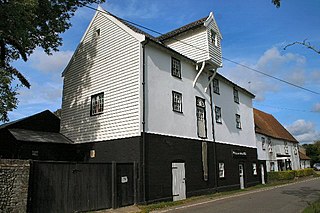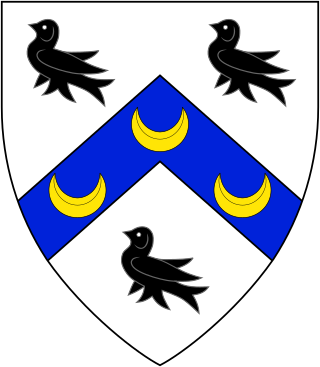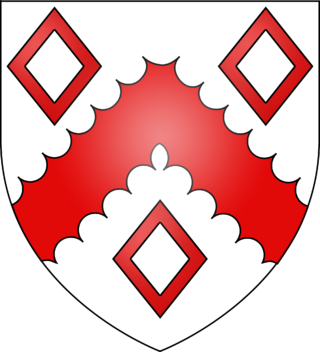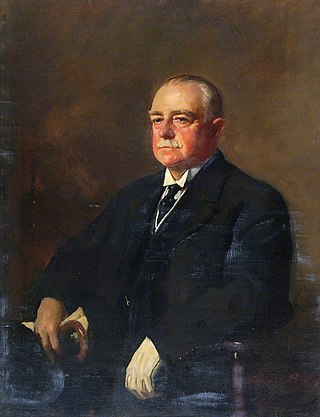There have been four baronetcies created for persons with the surname Clark, all in the Baronetage of the United Kingdom. Two of the creations are extant as of 2010.

Pakenham is a village and civil parish in the West Suffolk district of Suffolk in eastern England. Its name can be linked to Anglo-Saxon roots, Pacca being the founder of a settlement on the hill surrounding Pakenham church. The village describes itself as the "Village of Two Mills", as it has a water mill which claims to be the only working example in the county. Pakenham Windmill has been restored and is maintained in working order.
The Adair Baronetcy, of Flixton Hall in the County of Suffolk, was a title in the Baronetage of the United Kingdom. It was created on 2 August 1838 for Robert Adair. He was succeeded by his eldest son, the second Baronet. He sat as Member of Parliament for Cambridge. In 1873 he was created Baron Waveney, of South Elmham in the County of Suffolk, in the Peerage of the United Kingdom. The barony became extinct on his death in 1886 while he was succeeded in the baronetcy by his younger brother, Hugh Adair, the third Baronet. The latter had earlier represented Ipswich in Parliament. Two of his sons, the fourth and fifth Baronets, both succeeded in the title. The fifth Baronet's son, the sixth Baronet, was a major general in the British Army. The title became extinct on the latter's death in 1988.

There have been twenty one baronetcies created for persons with the surname Williams, eight in the Baronetage of England, three in the Baronetage of Great Britain and ten in the Baronetage of the United Kingdom. Only six of the creations are extant as of 2017.
There have been two Webster baronetcies.
Four baronetcies have been created in the surname of Fowler, all of which are now extinct.

There have been two Baronetcies created for persons with the surname Hickman, one in the Baronetage of England and one in the Baronetage of the United Kingdom.
There have been four baronetcies created for persons with the surname Bell, all in the Baronetage of the United Kingdom. One creation is extant as of 2007.
There have been five baronetcies created for persons with the surname Evans, one in the Baronetage of Ireland and four in the Baronetage of the United Kingdom. All of the baronetcies are now extinct.

There have been seven baronetcies created for persons with the surname Watson, one in the Baronetage of England, one in the Baronetage of Great Britain and five in the Baronetage of the United Kingdom. One creation is extant as of 2016.

The Spring Baronetcy, of Pakenham in the County of Suffolk, is a title in the Baronetage of England.

The Spring family is a Suffolk gentry family that has been involved in the politics and economy of East Anglia since the 15th century, as well as holding large estates in Ireland from the 16th century.

Sir Thomas Spring, 3rd Baronet of Pakenham Hall in Pakenham, Suffolk, was an English baronet and landowner who served as High Sheriff of Suffolk in 1696.

Sir Thomas Thornhill, 1st Baronet was a British Conservative Party politician.
There have been three baronetcies created for persons with the surname Duncan, one in the Baronetage of Great Britain and two in the Baronetage of the United Kingdom. All three creations are extinct.
There have been two baronetcies created for members of the Churchman family, both in the Baronetage of the United Kingdom. Both creations are extinct.
There have been two baronetcies created for persons with the surname Greene, one in the Baronetage of England and one in the Baronetage of the United Kingdom. Both creations are extinct.
There have been two baronetcies created for persons with the surname Thornhill, one in the Baronetage of England and one in the Baronetage of the United Kingdom. Both creations are extinct.

Lieutenant-Colonel Arthur Charles Churchman, 1st Baron Woodbridge, DL, known as Sir Arthur Churchman, Bt, between 1917 and 1932, was a British tobacco manufacturer, soldier and Conservative politician.

Riddlesworth Hall is a country house, and was formerly used as a boarding school. It is located in Riddlesworth, Norfolk, England.









